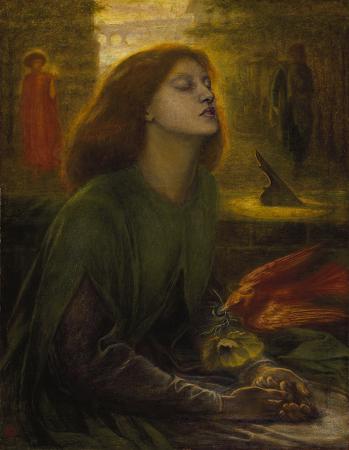
Beatrice Portinari. Beatrice Bice di Folco Portinari was an Italian woman who has been commonly identified as the principal inspiration for Dante Alighieri's Vita Nuova, and is also commonly identified with the Beatrice who appears as one of his guides in the Divine Comedy in the last book, Paradiso, and in the last four canti of Purgatorio.
There she takes over as guide from the Latin poet Virgil because, as a pagan, Virgil cannot enter Paradise and because, being the incarnation of beatific love, as her name implies, it is Beatrice who leads into the beatific vision. Scholars have long debated whether the historical Beatrice is intended to be identified with either or both of the Beatrices in Dante's writings.
She was apparently the daughter of the banker Folco Portinari, and was married to another banker, Simone dei Bardi. Dante claims to have met a Beatrice only twice, on occasions separated by nine years, but was so affected by the meetings that he carried his love for her throughout his life.
The tradition that identifies Bice di Folco Portinari as the Beatrice loved by Dante is now widely, though not unanimously, accepted by scholars. Boccaccio, in his commentary on the Divine Comedy, was the first one to explicitly refer to the young woman; all later references are dependent on his unsubstantiated identification.
Clear documents on her life have always been scarce, helping to make even her
There she takes over as guide from the Latin poet Virgil because, as a pagan, Virgil cannot enter Paradise and because, being the incarnation of beatific love, as her name implies, it is Beatrice who leads into the beatific vision. Scholars have long debated whether the historical Beatrice is intended to be identified with either or both of the Beatrices in Dante's writings.
She was apparently the daughter of the banker Folco Portinari, and was married to another banker, Simone dei Bardi. Dante claims to have met a Beatrice only twice, on occasions separated by nine years, but was so affected by the meetings that he carried his love for her throughout his life.
The tradition that identifies Bice di Folco Portinari as the Beatrice loved by Dante is now widely, though not unanimously, accepted by scholars. Boccaccio, in his commentary on the Divine Comedy, was the first one to explicitly refer to the young woman; all later references are dependent on his unsubstantiated identification.
Clear documents on her life have always been scarce, helping to make even her
Wikipedia ...